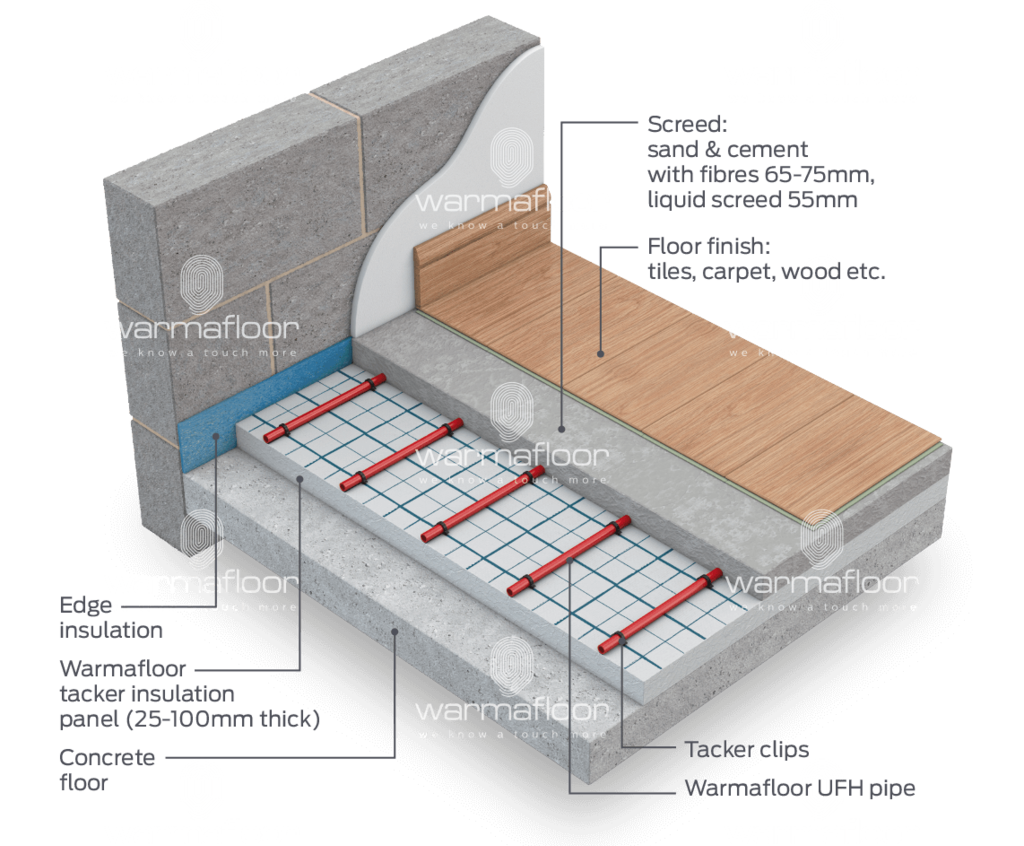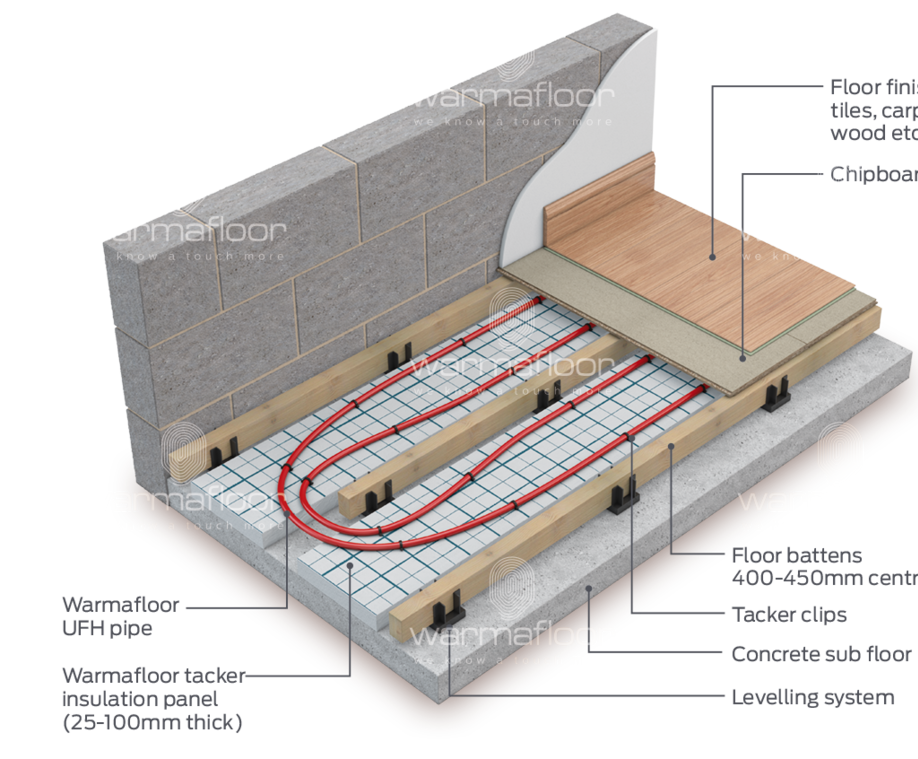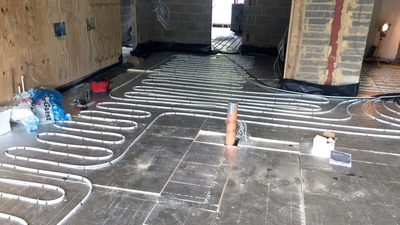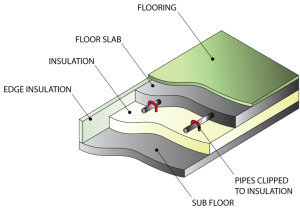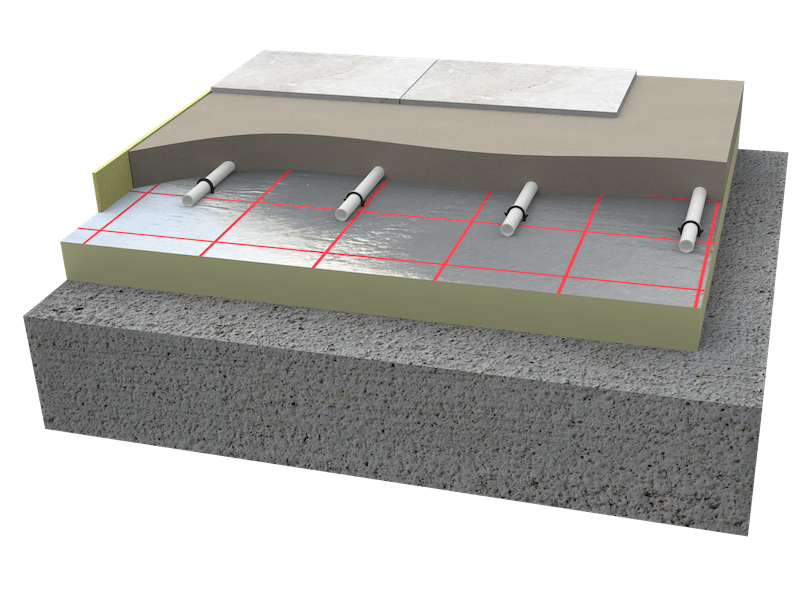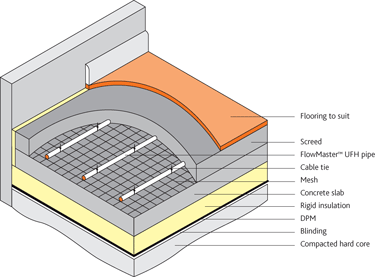The Importance of Proper Insulation for Underfloor Heating with Concrete Floors
Underfloor heating systems are becoming increasingly popular in modern homes, and concrete floors are a common choice for many homeowners. However, it is important to understand the significance of proper insulation when installing underfloor heating with concrete floors.
Proper insulation plays a crucial role in maximizing the efficiency and effectiveness of underfloor heating systems. Without adequate insulation, a significant amount of heat can be lost through the concrete slab, resulting in higher energy consumption and increased heating costs. This can also lead to uneven distribution of heat across the floor, with areas closer to the heating source becoming excessively warm while those further away remain cooler.
Insulating the concrete floor helps to reduce heat loss by providing a barrier between the heated pipes and the concrete slab. This prevents the heat from escaping downwards and instead directs it upwards into the room, ensuring efficient heating and maintaining a comfortable temperature throughout the space. Additionally, insulation helps to minimize heat transfer to the ground, which is particularly beneficial in buildings with suspended floors or buildings located in colder climates.
Proper insulation also helps to improve the response time of the underfloor heating system. When the heating pipes are installed in the concrete floor, the heat needs to travel through the slab before reaching the surface. With insulation, the heat is retained within the pipes and is quickly transferred to the room, resulting in faster warm-up times and a more responsive heating system.
In addition to energy efficiency and improved heating performance, proper insulation also offers soundproofing benefits. Concrete floors can often transmit noise, causing disturbances and reducing overall comfort. Insulation helps to absorb and dampen sound, creating a quieter and more peaceful living environment.
Proper insulation is essential when installing underfloor heating with concrete floors. It ensures efficient heating, reduces energy consumption, improves heating response time, and provides soundproofing benefits. By investing in quality insulation, homeowners can maximize the effectiveness of their underfloor heating system and enjoy a comfortable and energy-efficient home.
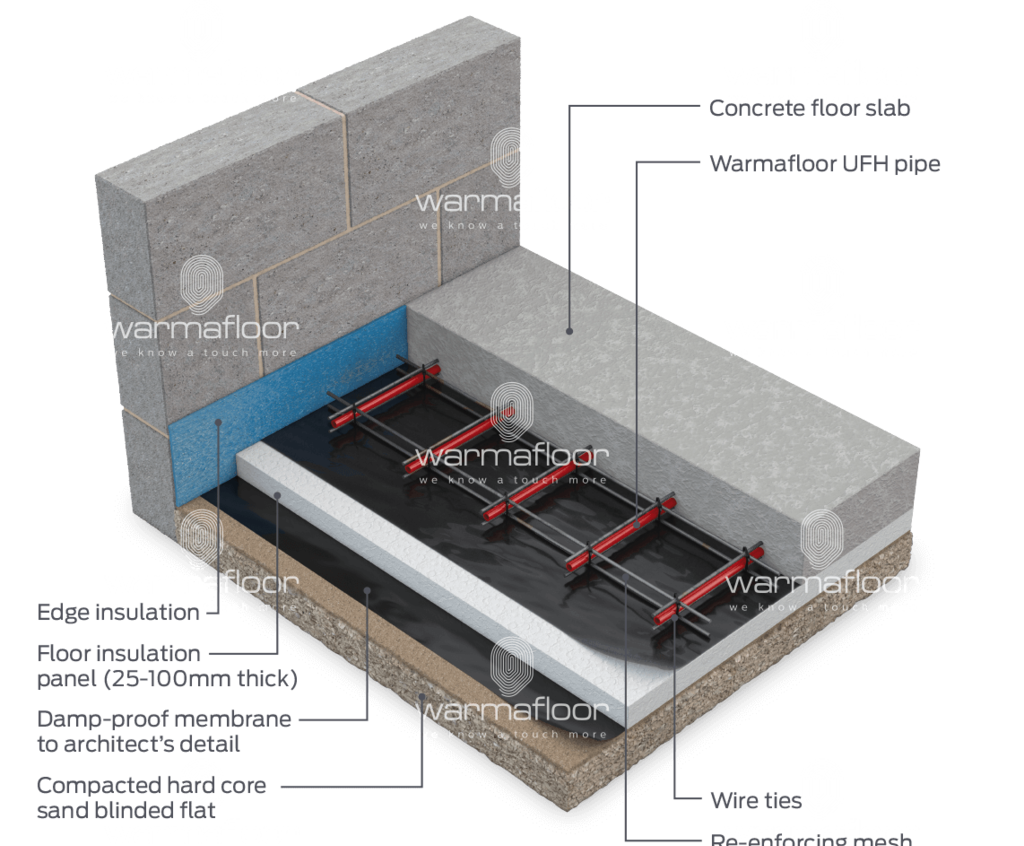
Types of Insulation Materials for Underfloor Heating in Concrete Floors
There are several types of insulation materials available for underfloor heating in concrete floors. Each type of insulation material has its own set of characteristics and benefits. Here are some of the commonly used insulation materials for underfloor heating in concrete floors:
Polystyrene boards: Polystyrene boards are a popular choice for underfloor heating insulation due to their high insulation properties. These boards are lightweight, easy to install, and provide excellent thermal insulation. They can effectively reduce heat loss and improve the energy efficiency of the underfloor heating system.
Extruded polystyrene (XPS) foam: XPS foam is a dense and rigid insulation material that is highly resistant to moisture. It is particularly suitable for underfloor heating in concrete floors as it provides excellent thermal insulation and helps to prevent heat loss. XPS foam is also durable and long-lasting, making it a reliable choice for insulation.
Polyurethane foam: Polyurethane foam is a versatile insulation material that can be used for various applications, including underfloor heating in concrete floors. It offers excellent thermal insulation and has a high resistance to moisture. Polyurethane foam is often applied as a liquid, which expands and solidifies to create a seamless insulation layer.
Mineral wool: Mineral wool is a type of insulation material made from natural or synthetic fibers. It is commonly used for underfloor heating in concrete floors due to its good thermal insulation properties. Mineral wool is lightweight, easy to install, and provides effective sound insulation as well.
Cork: Cork is a sustainable and eco-friendly insulation material that is gaining popularity for underfloor heating in concrete floors. It offers good thermal insulation and has excellent acoustic properties. Cork is also moisture-resistant and can help to reduce heat loss in the underfloor heating system.
Reflective foil insulation: Reflective foil insulation consists of a layer of foil that reflects heat back into the room, preventing heat loss through the concrete floor. It is typically installed between the concrete floor and the underfloor heating system. Reflective foil insulation is lightweight, easy to install, and provides an additional layer of insulation.
Benefits of Insulating Concrete Floors for Underfloor Heating Systems
Increased Energy Efficiency: Insulating concrete floors for underfloor heating systems can significantly improve energy efficiency. The insulation helps to retain heat within the floor, reducing the amount of energy needed to maintain a comfortable indoor temperature. This can lead to lower energy bills and reduced carbon emissions.
Enhanced Heat Distribution: Concrete floors without insulation can absorb and store heat unevenly, resulting in hot and cold spots throughout the room. Insulating the concrete floor helps to distribute the heat more evenly, creating a comfortable and consistent temperature throughout the space. This allows for better control of the heating system and eliminates the need for additional heating sources.
Reduced Heat Loss: Insulating the concrete floor acts as a barrier, preventing heat from escaping downwards into the ground. This reduces heat loss and ensures that the heat generated by the underfloor heating system is utilized efficiently within the room. As a result, the system does not have to work as hard to maintain the desired temperature, leading to improved energy efficiency.
Noise Reduction: Concrete floors can often transmit noise, causing potential disturbances in the space. Insulating the concrete floor helps to reduce sound transmission, creating a quieter and more peaceful environment. This is particularly beneficial in multi-story buildings or areas where noise control is important, such as bedrooms or offices.
Increased Comfort: Insulating concrete floors can greatly enhance the overall comfort of a space. The insulation provides a warm and cozy floor surface, eliminating the discomfort of stepping on a cold floor. This is especially appreciated during colder months or in areas with colder climates. Additionally, the even heat distribution from the underfloor heating system ensures a comfortable temperature throughout the room.
Longer Lifespan of Heating System: By insulating the concrete floor, the underfloor heating system is protected from unnecessary wear and tear. The insulation helps to maintain stable and consistent temperatures, reducing the strain on the heating system. This can extend the lifespan of the system and reduce the need for repairs or replacements.
Improved Indoor Air Quality: Insulating concrete floors can also contribute to improved indoor air quality. The insulation acts as a barrier against moisture, preventing the formation of mold and mildew. This helps to create a healthier living environment by reducing the risk of respiratory issues and allergies.
How to Choose and Install the Right Insulation for Underfloor Heating in Concrete Floors
Choosing the right insulation for underfloor heating in concrete floors is crucial for optimizing energy efficiency and ensuring comfortable heating throughout a building. Here are some important factors to consider when selecting and installing insulation for underfloor heating in concrete floors.
Type of insulation:
There are various types of insulation materials available for underfloor heating in concrete floors. The most commonly used options include rigid foam boards, spray foam insulation, and reflective foil insulation. Each type has its own unique properties and advantages. Consider factors such as thermal conductivity, moisture resistance, and ease of installation when choosing the right type of insulation for your concrete floor.
Thermal conductivity:
Thermal conductivity refers to the ability of a material to conduct heat. It is important to choose an insulation material with low thermal conductivity to minimize heat loss and maximize the efficiency of underfloor heating. Look for insulation materials with a high R-value, which indicates their thermal resistance and ability to retain heat.
Moisture resistance:
Concrete floors can be susceptible to moisture, which can compromise the effectiveness of insulation and lead to mold or mildew growth. Therefore, it is crucial to choose insulation materials that have good moisture resistance properties. Look for insulation products with vapor barriers or coatings that provide protection against moisture infiltration.
Installation method:
The installation method for underfloor heating insulation in concrete floors can vary depending on the type of insulation chosen. Some insulation materials can be laid directly on the concrete subfloor, while others may require additional layers or adhesive. Consider the ease of installation and compatibility with your underfloor heating system when selecting insulation.
Thickness:
The thickness of insulation is an important factor to consider as it determines the overall thermal performance of the underfloor heating system. Insulation thickness should be chosen based on the specific requirements of the building and the desired level of insulation. Thicker insulation generally provides better thermal insulation and reduces heat loss.
Professional installation:
Installing insulation for underfloor heating in concrete floors can be a complex task. It is recommended to seek professional assistance to ensure proper installation and to avoid any potential issues or mistakes. Professionals have the expertise and knowledge to choose the right insulation materials and install them correctly for optimal performance.
Underfloor heating for timber battened floors Warmafloor ESI
Efficient planning to avoid common underfloor heating mistakes
Insulation for Electric Underfloor Heating Systems
In floor Heating Insulation-Under Floor Heating Insulation-Radiant
Floor Construction – Underfloor Heating Systems Ltd
Floor Construction – Underfloor Heating Systems Ltd
Water Underfloor Heating Floor Constructions
Underfloor Heating System For Structural Concrete Floors
Installing underfloor heating into an existing floor FloorIQ
Underfloor heating insulation under slab installation by Continal Underfloor
Related Posts:
- Applying Concrete Floor Paint
- Non Slip Concrete Floor Sealer
- How To Paint Concrete Garage Floor
- Outdoor Concrete Floor Ideas
- Concrete Floor Covering Ideas
- Cracks In Polished Concrete Floors
- Drylok Concrete Floor Paint Colors
- Polished Concrete Floor Thickness
- Residential Stained Concrete Floors
- Cheap Concrete Floor Finishes

